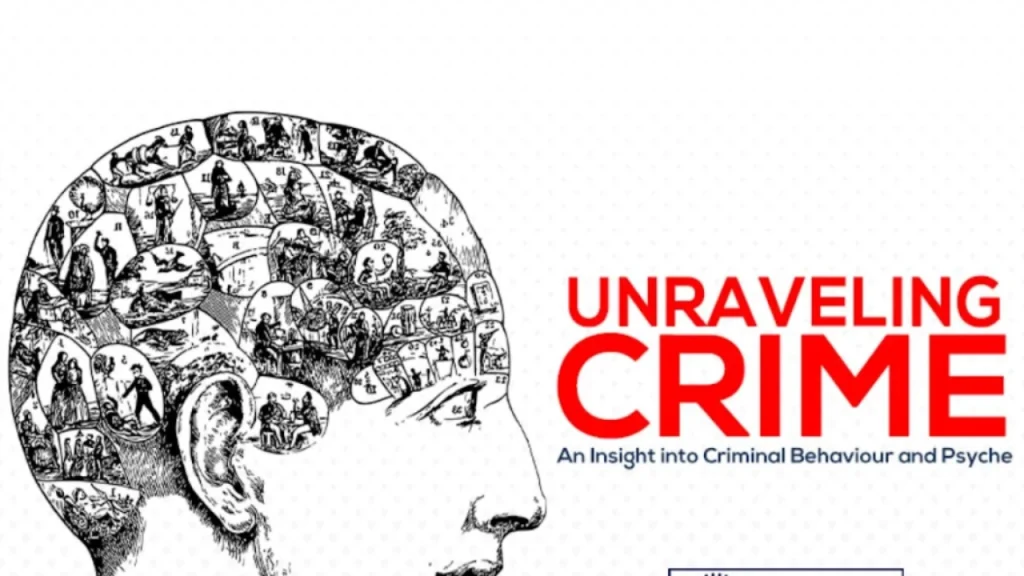Psychologists have spent a lot of time researching the complicated topic of criminal behavior. Understanding the underlying causes of criminal conduct is the goal of the study of the psychology of crime. Criminal behavior is influenced by a wide range of elements, including genetic, environmental, and social influences.
Genetics is one of the psychological aspects of crime that is most frequently examined. According to research, criminal behavior has a large genetic component. People are more prone to commit crimes themselves if they come from a family with a history of doing so. This is attributed to a mix of environmental and genetic influences, as well as a propensity for particular personality traits like impulsivity and violence.
Environmental factors of criminal behavior:

It also plays a significant role in criminal behavior. Additionally, the environment has a big impact on criminal conduct. People who are raised in hostile, violent, or drug-using situations are more prone to commit crimes later in life. It is believed that this is caused by a confluence of environmental and social factors, including exposure to unfavorable role models, a lack of resources, and a lack of opportunities for constructive socialization.
Social factors of criminal behavior:
Criminal behavior is also significantly influenced by social variables like peer pressure. According to research, those who hang out with criminal peers are more likely to commit crimes themselves. This is attributed to a number of environmental and social reasons, including the need for acceptance and the influence of unfavorable role models.
Crime is significantly influenced by personality qualities as well. Crime is more likely to be committed by people who have tendencies like impulsivity, sensation seeking, and poor self-control. This is attributed to a genetically determined tendency toward particular personality traits as well as exposure to unfavorable environmental stimuli.
The last important aspect in criminal behavior is cognitive issues. People who have faulty thought processes, such as those who think it is acceptable to commit crimes, are more inclined to do so. This is believed to be brought on by a confluence of environmental and cognitive factors, such as exposure to unfavorable role models and a lack of access to supportive socialization.
Causes of crime:
There are many aspects of causes of crime which are mentioned below:-
- Poverty is one of the main aspects which causes crime. Crime seems to be more prevalent in nations with high economic deprivation rates than in other nations. People devote their time to criminal activities because they are not only an easy way to achieve what they want but also do not need any other essential skills as they lack the resources to secure a living in the proper ways.
- Peer pressure is another significant factor that causes criminal behavior among teenagers and young adults. This is the most difficult phase of life where people believe that what they are doing is always right.
- Crime and drugs are closely related to each other. If someone is drunk or otherwise intoxicated, they are more likely to engage in criminal activity than they would be otherwise. The primary issue emerges when they develop drug addictions and think they need the drugs to survive.
- Religion is another factor that causes criminal behavior in youths. Regrettably, religion continues to play a factor in a number of societal divides and problems today. Even though it is a fundamental human right, many people are denied the opportunity to practise their own faith. As a result, believers start to resent this.
Psychology of criminal behavior:

Criminal psychology is the study of a criminal’s intentions, ideas, behaviors, or responses with the aim of evaluating and spotting trends that will help the police or other law enforcement organizations find suspects in a crime or support a court during proceedings. Criminal psychologists are professionals who specialize in the psychology of criminal behavior. The main objective of criminal psychology is to provide assistance in determining the causes of criminal behavior as well as the victim’s reaction to the crime.
Criminal Behaviour Analyst:
By studying a criminal’s conduct prior to, during, and following the commission of a homicide, this course on “Criminal Behavior Analyst” demonstrates the distinction between an organized and disorganised criminal. Additionally, his selection of the victim is also given a lot of thought in this training.
This course provides an understanding of the criminal mind so that individuals can comprehend the motivations behind criminal behavior, particularly in cases of rapes and murders with sexual motives.
The overall goal of this course is to develop a profile of a killer by looking at his methods and distinctive markings. The FBI uses the techniques covered in this course when investigating homicides.
Conclusion:
A complex topic, the psychology of crime incorporates a number of variables, including heredity, environment, social influences, personality traits, and cognitive factors. Our ability to effectively avoid criminal activity and meet the needs of those who have engaged in it depends on our ability to comprehend these elements. We may fight to create safer, healthier, and more egalitarian communities by addressing the root causes of criminal behavior.



